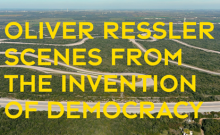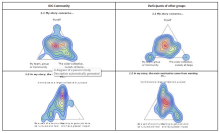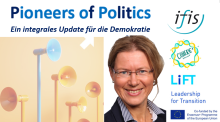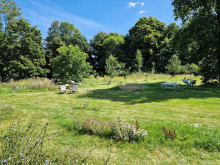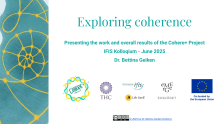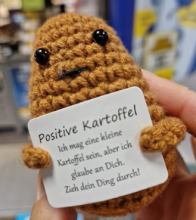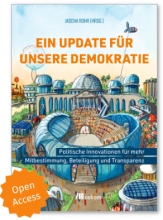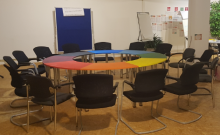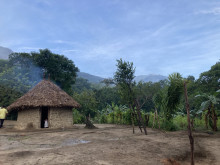The Integral (Meta-) Studies Blog
The IFIS blog contains two kinds of entries:
a) reflections about recent IFIS Colloquium sessions
b) considerations about big picture science.
The latter are a place for reflecting on the emergence of integrative varieties of meta-level science and how they can be practiced in research activities and inquiry settings of all kinds.
The notion of "integral" is used here to refer to all those meta-level knowledge traditions that have an integrative purpose.
By using the tags you can search for specific keywords or contents.
Latest Blog entries:
Szenen vom Untergang der Demokratie – Eindrücke aus der Ausstellung im Tinguely-Museum Basel
Am 2. Januar unternahmen vier Kolleg:innen vom Zentrum für integrale & Metamoderne Politik mit Freude (ZEMPF) eine Neujahrsexkursion ins Basler Museum Tinguely. Der Titel der Ausstellung „Scenes from the Invention of Democracy“, sowie die Frage des Tinguely-Museums: „Braucht unsere Demokratie ein Update?“ hatten uns neugierig gemacht.
Why Body-Mindedness Matters - A Learning Essay
Image: "On Embodiment" Art House Dallas
Body-Mindedness as a Practice towards Personal Coherence
Introduction: Why Body-Mindedness Matters
We live in times of great complexity, fragmentation, and uncertainty. Many people sense the dissonance between what they know intellectually and how they actually live. We aspire to balance, presence, and clarity, yet our daily lives often pull us into cycles of stress, reactivity, and disconnection.
Exploring (in)coherence in communities of change agents using Sensemaker®. What "outliers" reveal about a system
Exploring (in)coherence in communities of change agents using Sensemaker®. What "outliers" reveal about a system
Reichtum und Kohärenz – ein unterbelichtetes Spannungsfeld
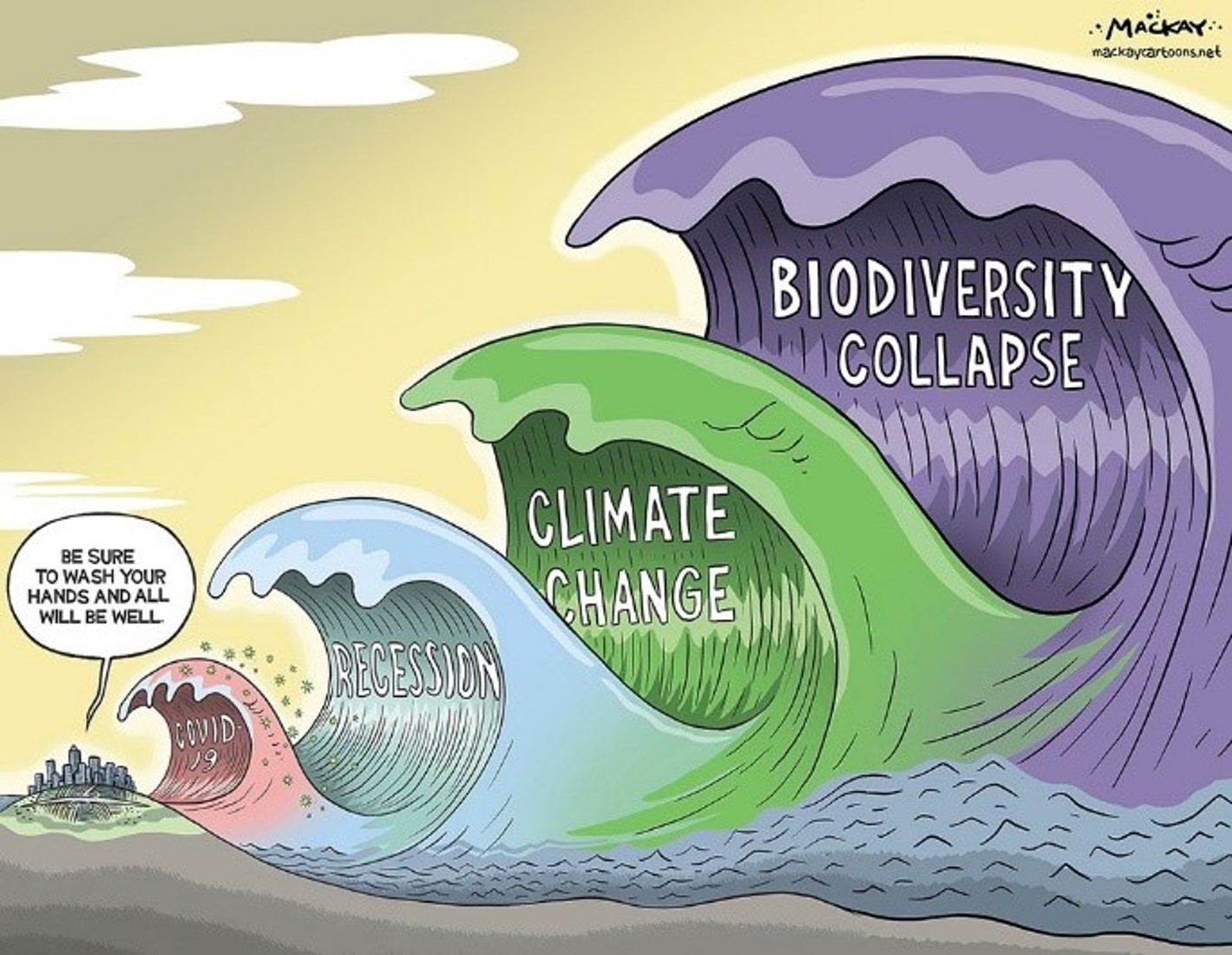
„Wir erschaffen gemeinsam Ergebnisse, die keiner wollen kann“, so lautet eine Kernthese von Otto Scharmers Gegenwartsdiagnose rund um die Kollateralschäden des modernen Wertesystems und seiner Denk- und Verhaltenslogiken, die bis heute in fast allen Bereichen unseren Lebensalltag dominieren.
Body-Mindedness: An Online-Live learning journey on Personal Coherence
Unlocking Deeper Harmony: How Embodied Practices Transform Our Inner and Outer Worlds
For those of us navigating the complexities of modern life, the quest for harmony—a state of balanced flow between chaos and order—often feels like an elusive ideal. We seek alignment not just in our external systems, but deeply within ourselves. But what if the key to unlocking this deeper harmony lies not just in intellectual understanding, but in our very own bodies?
Creating Islands of Coherence: Transformation Intensive and the Power of Inner Transformation
In Mid-August 2025, six alumni from earlier Transformation Intensive (TI) introductory courses gathered for 7 immersive days of
Learnings from Online Colloqium 80 - Exploring coherence
The IFIS colloquium "Exploring coherence" was held online in June 2025 and participants were invited to experiment, explore, reflect and exchange around the topic of coherence. Here is a summary of participants' experiences, with some of the original quotes, prompted by the 2 kick-off question
Where do you notice coherence or incoherence in your communities?
Musicosophia und Dialog - Zwei achtsame Geschwister im Geiste
Der letzte integrale politische Salon im Juni war dem Thema „Musicosophia und Achtsamer Dialog“ gewidmet.
Magische Momente beim Dialogabend "Medien"
Wieder einmal hatte unser Kooperationsprojekt, die Aktion Brückenschlag, zu einem Dialogabend eingeladen, diesmal zum Thema „Medien“. 20 Bürger/innen waren gekommen, um miteinander zu erforschen, welche Rolle Medien bei der Entstehung von Polarisierung und gesellschaftlicher Spaltung spielen, und wie wir selbst davon betroffen sind – oder womöglich durch die Art unserer eigenen Mediennutzung selbst dazu beitragen.
Integral Politics and Coherence
The Strategic Partnership Cohere+ explores the quality of what we call coherence in social fields, in particular the field of of social change makers working towards transformative change. The underlying assumption is that if groups of people are in a coherent state, cooperation flows much more easily and effortlessly than if there was some kind of unaddressed tension or conflict in the shared relational space.
Kohärenz in Aktion: Wie die Magie des Runden Tisches Flow erzeugt
Nach neun Monaten war es soweit: die Vision der Hinterzartener Arbeitsgruppe (AG) Lebensqualität von ihrem eigenen Runden Tisch hat sich materialisiert – ein Ergebnis und seinerseits Quelle von Kohärenz in Aktion!
Wie Konflikte entstehen und wie wir sie lösen können - Inspirationen aus Spiral Dynamics
Was haben unsere Werte und die darunter liegenden Bedürfnisse damit zu tun, wie wir uns in Konflikten verhalten – und wie unsere Konflikte überhaupt entstehen? – Alles, so jedenfalls die These von Prof. Clare W. Graves, Urheber der später als Spiral Dynamics bekannt gewordenen Modells der Entwicklung von Wertesystemen im Menschen und Gesellschaften.
Unsere Politik braucht ein integrales Update!
Die Welt präsentiert uns immer mehr Gründe, warum unser politisches "Betriebssystem" reif für ein integrales Update ist.
Eine runde Sache: Runder Tisch zum Thema Migration
Eine runde Sache war unser Runder Tisch im Freiburger Haus des Engagements, den ich diesmal gemeinsam mit Tanja Martin (Holistic Journey) moderieren durfte.
Regeneratives Wissen aus indigenen Kulturen
Reflektionen zu unserem Online-Kolloquium Nr. 71 am 12.6.2024

